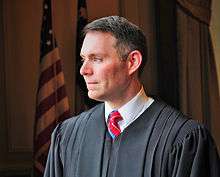Richard Dietz
| Richard Dietz | |
|---|---|
 | |
| Judge on the North Carolina Court of Appeals | |
| Appointed by | Pat McCrory |
| Preceded by | Robert N. Hunter, Jr. |
| Personal details | |
| Born |
February 1, 1977 Pennsylvania |
| Spouse(s) | Kelley Dietz |
| Residence | Winston-Salem, North Carolina |
| Alma mater | Wake Forest University School of Law |
| Occupation | Judge |
Richard Dietz (born February 1, 1977) is a judge on the North Carolina Court of Appeals. He was appointed by Governor Pat McCrory to fill the vacant seat created by the elevation of Robert N. Hunter, Jr. to the North Carolina Supreme Court.[1]
Background and Personal Life
Dietz grew up in a small Pennsylvania Dutch family with roots in the mountains of north central Pennsylvania. He is a Lutheran. He comes from a family of railroad and telephone workers and was the first in his family to attend college.[2]
Dietz is married to Kelley Dietz, a Roanoke, Virginia native. The couple were married in Wait Chapel on the campus of Wake Forest University. They now live in Winston-Salem, North Carolina.
Education
Dietz graduated first in his class from Wake Forest University School of Law and served as research editor of the Wake Forest Law Review. He earned his bachelor’s degree in business from Shippensburg University, graduating summa cum laude and serving as president of the University Honors Program. Dietz attended both Wake Forest Law School and Shippensburg University on full academic scholarships.[3]
After law school, Dietz clerked for Judge Samuel G. Wilson on the U.S. District Court for the Western District of Virginia and Judge H. Emory Widener, Jr. on the U.S. Court of Appeals for the Fourth Circuit.
Following his clerkships, Dietz served as a research fellow at Kyushu University in Japan, where he studied comparative and international law issues including the Hague Service Convention and the global implications of the Sarbanes-Oxley Act.
Professional career
Dietz began his private law practice as an associate at Covington & Burling, a large law firm in Washington, D.C. After two years in Washington, Dietz returned to Winston-Salem, North Carolina and became a partner at Kilpatrick Townsend & Stockton, a 650-lawyer international law firm with its roots in North Carolina.
Dietz handled a number of high-profile appeals in private practice. He argued in the U.S. Supreme Court in Abramski v. United States, 134 S.Ct. 2259 (2014),[4] a prominent gun law case that addressed the scope of the straw purchaser doctrine. Dietz also represented a class of hundreds of thousands of Native Americans in several appeals in the Cobell v. Salazar litigation involving the U.S. government's mismanagement of Indian trust money.
Dietz previously served as Vice Chair of the North Carolina Bar Association's Appellate Practice Section and currently serves on the Appellate Section Council and the Appellate Rules Committee. In 2013, he was appointed to a four-year term on the North Carolina Courts Commission, a group of judges, lawyers, legislators, and private citizens who study and recommend changes to the court system. He is a permanent member of the Fourth Circuit Judicial Conference and a member of the Appellate Judges Conference of the American Bar Association. He is also a member of the Chief Justice Joseph Branch chapter of the American Inns of Court.[5]
Dietz is a North Carolina board certified specialist in Appellate Practice. He is one of only two appellate specialists on the 15-member North Carolina Court of Appeals and one of only 27 board certified specialists in North Carolina.[6]
Awards and Honors
Dietz was named one of “40 Leaders Under Forty” by the Triad Business Journal in 2014.[7]
Dietz was listed in the 2012, 2013, and 2014 editions of North Carolina Super Lawyers magazine as a “Rising Star” in the area of Appellate Law.[8]
Dietz received the Outstanding Young Alumnus Award from Shippensburg University in 2014.[9]